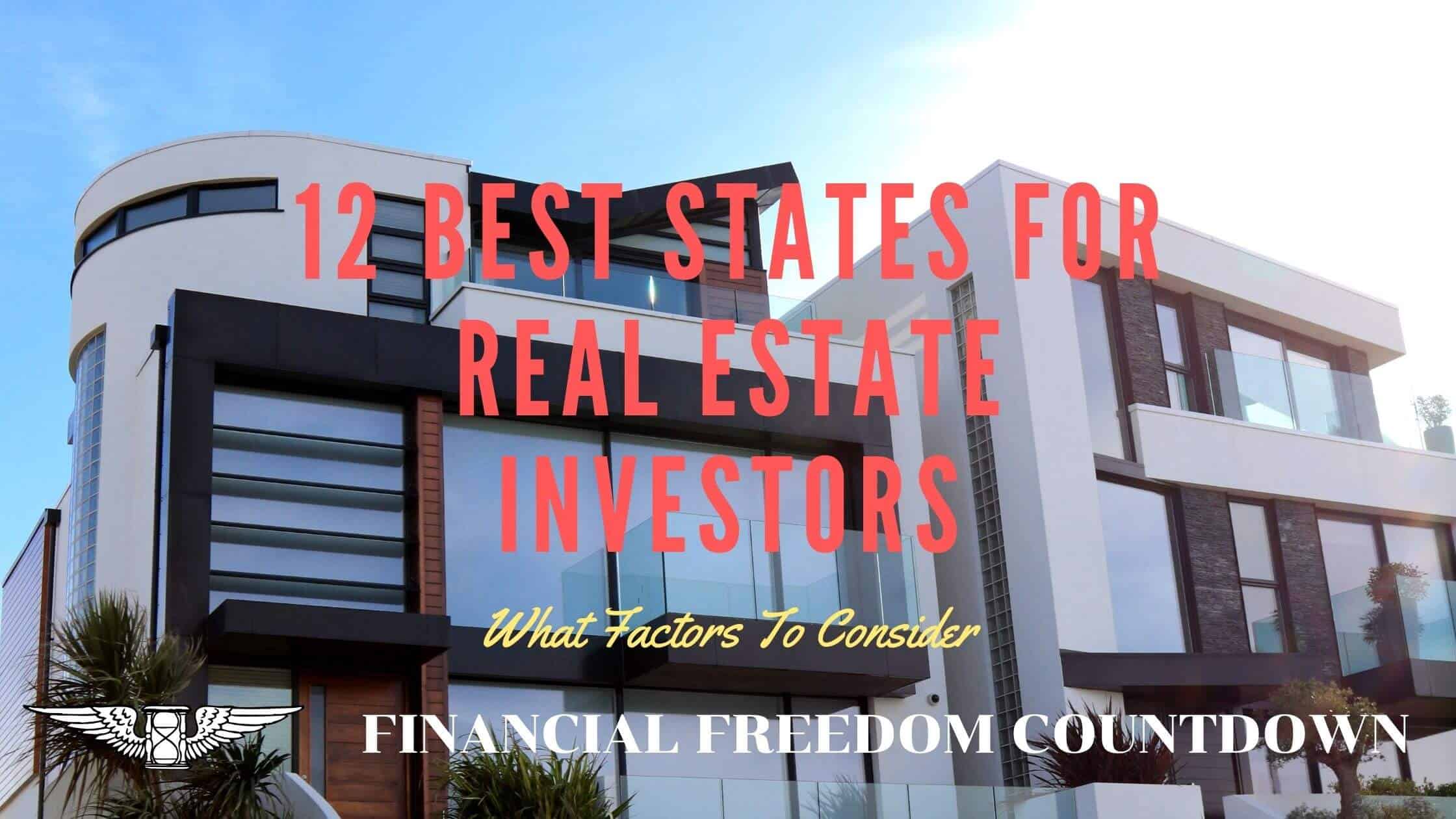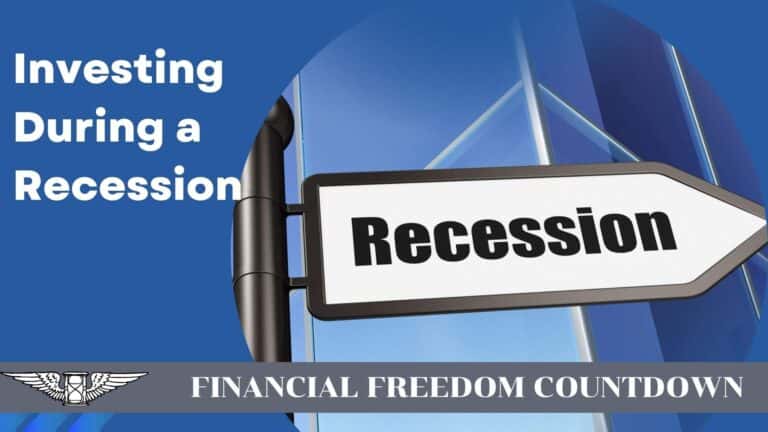12 Best States For Real Estate Investors And What Factors To Consider

With rising inflation, everyone is looking at protecting their purchasing power if not growing their wealth. Looking at the list of best passive income-producing assets, we know that real estate tops the list. The real estate market is booming, and many people are looking for investment properties. But where should they buy?
There’s no shortage of lists ranking the best states for real estate investors, but most of them focus on the wrong criteria. They don’t look at how much money you can make as an investor, which matters! How can you choose a state if all those “top 10 best places” lists only talk about things like the weather or tax rates?
We’ve created our list that ranks buying an investment property in each state based on the housing market. But more importantly, we have highlighted the factors you should pay attention to when choosing the best states for real estate investors and what resources you can use to create your list!
Let us get started.
Factors To Consider When Choosing Best States For Real Estate Investors
To maximize the returns from your real estate investment, you want to buy property in states with the following features:
Population Growth
Population growth creates a consistent and predictable demand for housing. You want the population in the city where you buy your property to be growing. You do not want to invest in a state with a declining population. If more people move away from the area, more houses will be available than people making it hard to find renters. Also, property prices will drop, making it hard for you to sell the property when needed.
Job Growth
States with consistent job growth rates tend to have higher income levels. More people in a state with a low unemployment rate can afford to pay higher rents. If the local economy is thriving, you can expect higher population growth and job creation to increase the demand for rental properties.
The job growth rate is also impacted by companies moving their jobs to certain states which are more business-friendly. Or states and cities pass laws or provide tax breaks to encourage corporations to move. In either case, the best states for real estate investors include ones with high job growth rates.
Rental Occupancy Rate
It is the percentage of all housing units in the area that renters occupy. You want to choose states with high rental occupancy rates so your properties will be easy to rent out.
Check how many of the available housing units are unoccupied in an area. Increased population and job growth in areas where rental occupancy rates are already high increases your chances of renting out sooner and at a higher rate.
Rent-to-income Ratio
It is how much renters are willing to spend on median rent compared to their income.
For example, if the average household spends 30 percent of their median income on rent, and the rent-to-income ratio is 20 percent (or below) in your state, it’s likely to be stable with less risk of default or eviction. There are several real estate investment risks so one should have an appropriate risk mitigation plan in place.
You want the rent-to-income ratio to be lower so tenants can afford to keep making payments.
Tenant Default Rate
You want to buy properties in an area with a low risk of tenants not paying their monthly rents. For this, you need to know the rent-to-income ratio and the job growth potential. So tenants who lose their jobs can find jobs quickly and continue to pay their rent.
Check the average eviction rate in an area to find out if tenants are likely to default or not. The lower the tenant default rate, the better it is for your investment properties.
Landlord Friendly Laws
You don’t want to buy a property where local governments mistreat landlords. It makes it hard for you to evict tenants and harder to collect rents.
For example, in New York City, landlords can’t carry out rental evictions quickly even if the tenant stops paying. In San Francisco, the tenants have a free lawyer available to fight any evictions. Guess how hard it will be to take back your property from the tenants in these cities? The eviction process in these cities is a nightmare for landlords.
On the other hand, there are states like Alabama where eviction laws favor landlords and make it easy to recover lost rent quickly.
Laws in some states allow landlords to charge market-rate rents, which can be challenging to obtain in other states with strict rent control laws.
Oregon has a statewide rent control policy.
Several cities in California have rent control. While your expenses are rising, you can’t raise your rent to market levels. If you consider inflation, you lose money by being a rent-controlled property investment landlord.
I would be OK with rent control if the unit were tied to income and certain professions like teachers or firefighters. But in San Francisco, you have tech executives continuing to occupy rent control units driving up the market rent for everyone else.
Also rent control shifts the burden of responsibility from the government providing the subsidies to the landlord subsidizing the tenant. If the government truly cared about tenants they should provide the difference in market rate and tenant affordability in the form of housing vouchers.
Registration Requirements
You want to avoid buying properties in places that require you to register with the authorities before finding tenants.
Several jurisdictions demand that landlords acquire both registrations and licenses to rent their real estate assets to tenants actively. Many of these certifications are expensive to obtain and renew.
When registration is needed, it takes time for you to get permits and find renters, so your investment property will earn less than if it were already occupied.
The state of New Jersey has comprehensive legal requirements for landlords: the Rent Security Deposit Act, which regulates security deposits, and the Landlord Registration Act, which requires landlords to register their properties with the state, often requiring a fee.
Maryland has a policy of statewide registration that comes with an annual charge.
High Rent-to-purchase Ratio
If you want to buy a house for the rental property, you need to consider that the rent covers the monthly cost of the rental real estate, so it is cash flow positive from day one. To figure out whether a property purchase is an intelligent investment, estimate your cap rate. Cap rate is calculated by dividing the annual net operating rental income by the purchase price. For cash-flowing income properties, I expect the cap rates to be at least 10%.
Investors will often buy a property that loses money monthly with a vague hope of the potential price appreciation, justifying the negative cash flow. While it is true that an increase in home cost is excellent for equity growth, it should never come at the expense of having an income-producing property.
Factors To Ignore When Choosing Best States For Real Estate Investors
The following factors should have no bearing when you choose the best states for investing in real estate.
Local Taxes
Real estate has several tax advantages like QBI deduction for rental property, 1031 exchanges, depreciation, etc., and you need to consider your tax planning strategy when picking different assets to invest in. But when looking at the best states for real estate investors, the local tax policies shouldn’t be a factor.
For example, Colorado has lower property taxes than many other states and a flat state tax rate of 4.63%. However, you may not end up being a resident of the state. So these tax advantages won’t be available to you. Property tax should get baked into your rent.
If income taxes in a state are high, the wages are also higher, as we see in San Francisco. Consequently, states with lower taxes usually have lower salaries. So it does even out in the end.
Rising Property Prices
When deciding where to invest in real estate, you want to aim for an area with good prospects for price growth. However, when the market is hot, prices rise everywhere. So consider the other factors instead of just focusing on property price increases when choosing a state.
Typically states with rapidly rising property prices offer lower cash flow, and you make your money only on selling the property or exchanging it for a larger one using IRS section 1031.
States where the property prices don’t rise as rapidly have a greater cash flow generally. Both approaches are acceptable, but you need to be aware of the trade-offs.
Weather
If you do not live in the rental property, should you care about the weather? Weather is an excellent factor for a primary residence, not for investment real estate. Of course, some states have harsher climatic conditions, which affect property maintenance.
But the cost of weather-related damage is often baked in the rental price or the property’s purchase price. I’d not focus on the weather when deciding on the best states for real estate investors.
List Of Best States For Real Estate Investors
If you wonder what state has the best real estate market, consider several different factors. First, the state needs a moderate-to-high cost of living so that people can afford high rents or pay higher prices for your commercial property. Secondly, real estate appreciation trends tend to follow historical data, so choosing a state where people have made money in the past is vital. A landlord-friendly political climate also plays an essential role in real estate growth.
Idaho
At least three factors play an essential role in making Idaho one of the best states for real estate investors. First, people are moving away from large cities to smaller ones, and you will find many in Idaho. Secondly, the cost of living in Idaho is 2.3% lower than the United States national average. People who live in Idaho are used to paying more money for housing as it is 14.1% above the national average. Income property owners experienced a real estate appreciation of 25.97% over the last 12 months and 142.15% over the previous decade, with no end in sight. Growth has been even more phenomenal in some cities, including Harrison, Island Park, and Athol neighborhoods.
Arizona
Arizona is experiencing the third-fastest recovery of jobs from its pandemic losses in the nation. It is expected that there will be over 700,000 new jobs added to the economy before 2030. The job growth makes it one of the best states for real estate investment as those people must have somewhere to live. In 2021, state legislators passed the most significant tax cut in the state’s history. The state also has very landlord-friendly laws. Real estate value appreciation has been 20.43% in the last two years. Many cities in Arizona are doing better than the state’s average, including Tucson, Chandler, Oro Valley, Flagstaff, and Gilbert.
Utah
When looking for the best state to buy property, consider Utah. The average earner in the state brings home $55,841 a year. While the average U.S. worker makes $19.33 per hour, the average in Utah is $26.85 an hour. The average residential property in Utah has a median sales price increase of 20.49% in the last year and 114.14% in the previous ten years. Courts in Utah routinely award triple damages for evictions. Utah cities to consider are Montezuma Creek, Park City, and Castle Creek.
Maine
Maine can be an excellent place for out-of-state real estate investing. Many people from New England and elsewhere choose to retire in this state. While the percentage of workers is lower than in some states, the median household income is $76,227. The average home cost has grown over 21.78% over the last year. The median home in Maine is selling for $305,000, making the state very attractive for people who want to buy lower-priced property in a good market with the ability to charge above-average rent. Washington and Aroostook counties have seen the biggest jumps.
Montana
Many people are escaping California and moving north to Montana, where they have more elbow room, making it one of the best real estate states. Real estate has appreciated an average of 17% over the last two years. Consider where you want to invest in this state carefully as Bozeman has a high cost of living while many other thriving communities in Montana are at or below the national cost of living. There are very few regulations on landlords in this state, and there is no statewide rent control.
New Hampshire
New Hampshire is the eighth wealthiest state in the nation, and it has no state sales, income tax, or capital gains taxes. The state has a high median income level. The average family income for households between 25 and 44 is $84,505, while the average pay for families a decade older is $93,545. In 2021, New Hampshire has seen record-high prices for single-family homes as more people work from home and discover this state’s scenic beauty. Prices have risen by about 25% in the last year, and there appears to be no end in sight. Consider buying in Hanover, Gilford, Campton, and Atkinson.
Alabama
Alabama is known for its humid subtropical climate and the longest navigable waterways in the United States. Gulf Shores, a popular holiday spot, is also located in Alabama.
Alabama is another appealing prospect for real estate investors, with a population of almost five million and a wide range of industries. The state’s stable employment base in education, manufacturing, and public service jobs has increased the demand for residential real estate and single-family rentals.
It also has a high housing occupancy rate of 85 percent. Furthermore, it has the lowest median property value of $150,000 on this list. In Alabama, Huntsville and Birmingham are some of the best cities for investment opportunities.
Rhode Island
The median home price in Rhode Island is $385,000. That is up 15% from a year ago. The median price of condo units sold in the second quarter of last year was $272,250. Homes are usually sold before they are even listed on the market. Almost 29% of sales were to buyers from out of state. The market is scorching for multi-family dwellings, with over a 16% increase in the third quarter and 37.9% more buildings sold.
Tennessee
Nashville is one of the places that real estate investors need to be taking a close look at. Nashville and the four surrounding counties are expected to see over 50% population growth before 2024. Forbes ranked the city 14th for job growth and 15th for careers and business. Long-term, over 500,000 people are expected to move to the region by 2040. In the last year, median home values in Nashville and much of the state have risen over 18%. Inbound migration has created a hot rental market.
Ohio
Ohio is another state that real estate investors need to consider. The average home price in Ohio is $232,780, making it ideal for the beginning investor. By comparison, the average U.S. home price was $350,000. People living in Ohio enjoy a mixed economy. Additionally, the cost of living in the Buckeye state is 15.4% less than the United States average. While you will have to keep any security deposits greater than $50 in an interest-bearing account, most laws in Ohio are very landlord-friendly.
Texas
The median Texas home value is $262,820, which has gone up 19% in the last year. Texas is a very affordable state to consider for real estate investments. The number of homes selling for more than $400,000 hit an all-time high, but the number of homes selling for less than $200,000 has slowed slightly. Average Days on the market fell to 27 days.
Texas laws favor the preservation of the property owner’s rights when lease conditions are violated. While some markets in larger cities, like Dallas and its north-central counterparts, are slowly declining, many smaller communities show robust growth.
Because of Texas’ recent push to attract business, many companies have relocated their headquarters from California to Texas, namely Oracle, H.P., and my moonshot company Tesla. The state has a growing population. And the job market growth is expected to be robust.
Florida
Florida is a coastal state compared to most other states on this list. It has over 80% occupancy, with the average home costing around $300,000.
The business-friendly nature of the state has attracted a lot of investments in recent years. Several V.C.s have moved from Silicon Valley to Florida and specifically Miami metro area. The mayor of Miami has launched a campaign not just to attract tech but also Web3 related startups. Miami was one of the first cities to have their city coin, and the mayor offered to receive his salary in Bitcoin.
Besides Silicon Valley, many investors from NYC and New Jersey have also migrated to Florida. High net worth individuals moving to a particular state always bodes well for the property market.
Resources To Identify The Best States For Investment Properties
Although we have covered some of the best places to invest in real estate, the cities and states on the list would keep changing based on the various investment factors we covered.
Some helpful resources I use to create my top real estate investing states are
- The Census Bureau population estimates by each metro.
- Redfin monthly rental market data.
- Zillow home value and inventory data.
- Local purchasing power parity from the Tax Foundation.
- The S&P CoreLogic Case-Shiller National Home Price NSA Index to track price changes of single-family homes.
- PwC Emerging Trends in Real Estate report for the top housing markets for the coming year.
- Department of Numbers for Employment by state and also the city.
Analyze data from all these websites every time you are buying income-producing real estate. Or even if you decide on flipping houses or wholesaling real estate in your local neighborhood.
After all, if there is reduced demand in the future, how will you exit your real estate investment properties?
What State Should I Buy An Investment Property?
We looked at the criteria for evaluating the best states for real estate investing and the list of actual states based on current economic conditions.
Since I live in California and, more specifically, the San Francisco Bay Area, I am confident it will never make the list of cities to invest in. San Francisco will be one of the worst cities to own investment property.
The biggest challenge with all these best states for real estate investors lists is that your state might not be on it more often than not.
And even if it is, it might not be your city, which leads to acting as a long-distance landlord. Of course, our list of real estate books for beginners has excellent recommendations for out-of-state landlords. Still, it involves building up systems and having sufficient properties to make an effort worthwhile. You need local property management to take care of your tenant’s issues and supervise contractors.
Since I live in San Francisco and do not want to be a remote landlord, I consider the best states for real estate investors when investing in crowdfunding real estate.
One of the criteria when selecting my investments on these platforms is to make sure the investment property is located in one of the top states for real estate investing.
Because even if the property is professionally managed, I want to ensure that the real estate syndication firm can obtain rents to pay me like clockwork. If they, unfortunately, have a bad tenant, the laws are favorable for a speedy eviction so they can rent it again to a paying tenant.
Of course, only the real estate crowdfunding platforms like Equity Multiple available for investors meeting the accredited investor qualifications permit you to select individual properties and, consequently, the states you want to invest in. CrowdStreet also allows you to choose a specific commercial property where you can apply the state filter.
But if you are a non-accredited investor, you cannot select individual properties since the fund structure is an eREIT.
Luckily few platforms have eREITS based on geography, which is a considerable advantage compared to the publicly traded Real Estate Investment Trust (REIT), which doesn’t filter based on states.
Hopefully, the Fundrise Heartland eREIT avoids the expensive states on the coasts, and the portfolio might not have landlord-unfriendly states such as New York and California.
Final Thoughts On The Best States For Real Estate Investors
Real estate is a great asset to build generational wealth. However, since many states and cities have different laws, it is advisable to create your criteria to identify the best states for real estate investing.
When creating such lists, you should go beyond states to define the best cities for your real estate investments.
For example, Washington has long been a favorite of real estate investors, and that trend is not changing anytime soon. Across the state, local economies are diversified and booming, increasing the median income. In the last decade, the average home’s value in Washington grew by 80.7%, and the average rent has increased at a higher rate.
But with more people renting in Seattle, the laws have been modified in the city to be more tenant-friendly. Seattle is not great for landlords due to the recently passed “first-in-time” law.
Similarly, you might find that Illinois is favorable to investing, but Chicago is not.
Since laws vary at a county and city level, you have to filter the best states for real estate investors before narrowing your search further.
Whether you decide to go for crowdfunded real estate or long-distance investing or even try real estate investing with little or no money down, it is imperative to be aware of the various location factors that impact your real estate investment portfolio.
Readers, have you invested in real estate, and if so, how did you pick the location? And for my non-US audience, do you also have differing laws in each state? How do you navigate them to arrive at the most real estate investor-friendly states?

John Dealbreuin came from a third world country to the US with only $1,000 not knowing anyone; guided by an immigrant dream. In 12 years, he achieved his retirement number.
He started Financial Freedom Countdown to help everyone think differently about their financial challenges and live their best lives. John resides in the San Francisco Bay Area enjoying nature trails and weight training.
Here are his recommended tools
Personal Capital: This is a free tool John uses to track his net worth on a regular basis and as a retirement planner. It also alerts him wrt hidden fees and has a budget tracker included.
Platforms like Yieldstreet provide investment options in art, legal, real estate, structured notes, venture capital, etc. They also have fixed-income portfolios spread across multiple asset classes with a single investment with low minimums of $10,000.





